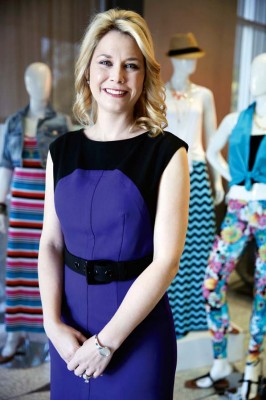
General Counsel
Wet Seal, Inc.
Foothill Ranch, California
When Alyson Barker walked into the Wet Seal corporate office for her first day on the job, she had the unique opportunity to set a precedent. After eight years of outsourcing its legal services, the clothing retailer had tasked Barker with reinstating the legal department. As if defining a culture wasn’t a tall enough order for an up-and-comer who studied at Georgetown before working for Jones Day LLP and Howrey LLP, Barker would also shepherd the company through the resolution of a class-action lawsuit.
To complicate the situation, the absence of a resident attorney had protracted the amount of time it took to review many of the company’s contracts. Barker’s first order of business was creating a system of organization that would allow her to meet the needs of the business in a more timely fashion. “For any lawyer that’s practiced at a law firm or in-house, it seemed so basic,” Barker says. With process and procedure in place, review time was cut down to two to three days, thereby helping Barker to quickly win the trust of her business partners, who were pleased with the efficiency that she brought to the process.
The next item on the list, continuing to build relationships and trust with the company’s business leaders, required a little more finessing. Barker partnered with Wet Seal’s business leaders to learn what issues mattered to them and to brainstorm ways she could deliver value by helping them meet their objectives. Barker explains that this has been one of the most rewarding aspects of her job. “Being in-house, you are not limited to providing legal advice in a vacuum,” she says. “You know the business and are part of the business, and that positively impacts the advice you give.”
Describing Wet Seal as “the most collegial company I’ve worked for,” Barker was well received by the employees whose insight she sought. The partnerships Barker has formed have paid off when she has needed an employee’s help to respond to discovery requests or to brainstorm ways to implement new policies in the least burdensome manner.
Barker has made inroads with the executive team as well. Focusing on finding solutions and shifting the company’s legal approach from responsive to proactive, she was able to mitigate compliance risks for Wet Seal by staying ahead of constantly changing policies on compensation, employee rights, and California’s Proposition 65, which requires retailers to make disclosures about potentially cancer-causing substances that may be present in consumer products.
With more than a year under her belt, Barker now has the chance to reflect on her transition to Wet Seal. She may have hit the ground running, but as the new legal department and the company’s declared success in her first civil suit would indicate, Barker has found her stride. “Anyone who says in-house is easier than working for a big law firm has not been in-house,” she says. “I’m working harder than ever before, but I am more rewarded because I’m part of the business, which allows me to come up with business solutions to legal challenges.”

